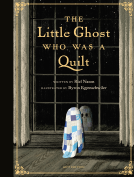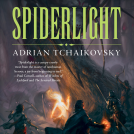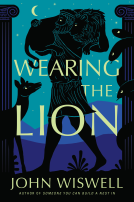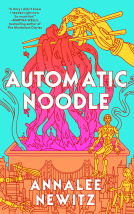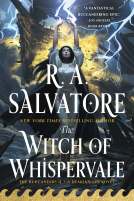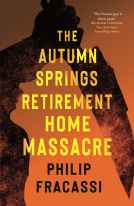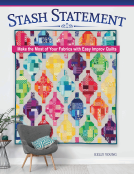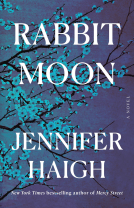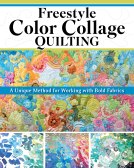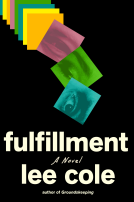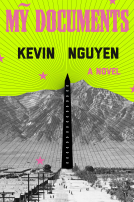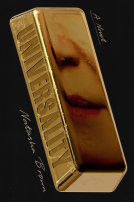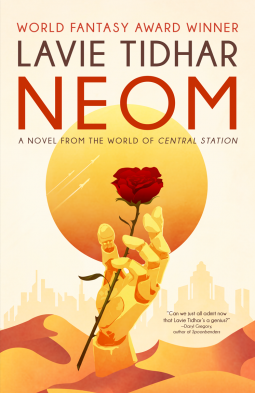
Neom
A Central Station Universe Novel
by Lavie Tidhar
This title was previously available on NetGalley and is now archived.
Send NetGalley books directly to your Kindle or Kindle app
1
To read on a Kindle or Kindle app, please add kindle@netgalley.com as an approved email address to receive files in your Amazon account. Click here for step-by-step instructions.
2
Also find your Kindle email address within your Amazon account, and enter it here.
Pub Date Nov 09 2022 | Archive Date Dec 08 2022
Talking about this book? Use #NeomANovelfromtheWorldofCentralStation #NetGalley. More hashtag tips!
Description
Today, Neom is a utopian dream—a megacity of the future yet to be built in the Saudi desert. In this deeply imaginative novel from the award-winning universe of Central Station, far-future Neom is already old. Sentient machines roam the desert searching for purpose, works of art can be more deadly than weapons, and the spark of a long-overdue revolution is in the wind. Only the rekindling of an impossible love affair may slow the inevitable sands of time.
“This was superb and I’m in awe of Tidhar’s vision. He’s conjured up a futuristic city that feels simultaneously ultramodern and also run down. The rich histories of the region and its cultures are seamlessly interwoven into the fabric of this fully-realized world.”
—The Speculative Shelf
The city known as Neom is many things to many beings, human or otherwise. It is a tech wonderland for the rich and beautiful, an urban sprawl along the Red Sea, and a port of call between Earth and the stars.
In the desert, young orphan Elias has joined a caravan, hoping to earn his passage off-world. But the desert is full of mechanical artefacts, some unexplained and some unexploded. Recently, a wry, unnamed robot has unearthed one of the region’s biggest mysteries: the vestiges of a golden man.
In Neom, childhood affection is rekindling between loyal shurta-officer Nasir and hardworking flower-seller Mariam. But Nasu, a deadly terrorartist, has come to the city with missing memories and unfinished business. Just one robot can change a city’s destiny with a single rose—especially when that robot is in search of lost love.
Lavie Tidhar's (Unholy Land, The Escapement) newest lushly immersive novel, Neom, which includes a guide to the Central Station universe, is at turns gritty, comedic, transportive, and fascinatingly plausible.
A Note From the Publisher
Advance Praise
A Foreword Book of the Day
“This is Tidhar at his best: the crazily proliferating imagination, the textures, the ideas, the dazzling storytelling. A brilliant portrait of community and its possibilities.”
—Adam Roberts, author of Purgatory Mount
[STARRED REVIEW] “In his signature style, Tidhar laces his future-set, fascinating tale with biblical references and nods to science fiction classics, here revitalized with added empathy…. Neom is an extraordinary and compassionate trek into the hearts of AI.”
—Foreword
“World Fantasy Award winner Tidhar takes readers back to the fascinating far-future world of 2016’s Central Station in this gentle narrative about self-fulfillment and one robot’s quest to reunite with a lost love. In Neom, a port city between Earth and space on the shores of the Red Sea, Mariam de la Cruz divides her days between several odd jobs while her nights are spent longing for quietude. Meanwhile, shurta officer Nasir questions the point of law enforcement as he spends most of his time handing out tickets for littering. An unnamed robot reunites these two childhood friends when Nasir and Mariam become entangled in the robot’s mission to resurrect a ‘golden man’ of legend. These quiet personal stakes play out against a vividly imagined world where ancient war machines stalk the deserts and seas, terrorist ‘art installations’ explode forever within stasis fields, and the human population in space tell stories of the eldritch creatures inhabiting the Oort clouds. Meanwhile, Tidhar offers a heartfelt exploration of artificially intelligent beings’ struggles to find existential meaning while being restrained by both coding and form. Fans of literary sci-fi are sure to be enchanted by the imaginative worldbuilding and tenderly wrought characters.”
—Publishers Weekly
“Tidhar (Central Station) writes another story that takes place within his Central Station universe. Neom is a future-oriented, techno city: a port of call to the stars for humans and a neighbor to the robots that roam the nearby desert searching for a purpose. Destinies will collide as a mechanical man initiates a robotic revolution, a former “terrorartist” seeks her buried memories, and three humans—Saleh, Mariam, and Nasir—have a chance to realize their dreams. Tidhar is a unique voice in science fiction and an author with many awards to his name. An enrapturing conglomeration of philosophy, psychology, and storytelling, the novel melds the what-ifs with a believable and relatable scenario. This is not a sequel so much as another saga in a well-developed and thought-out world. VERDICT Old and new fans alike will adore this fascinating new addition to Tidhar’s future Earth universe, and science fiction buffs would do well to put Tidhar on their radar of must-read authors.”
—Library Journal
“Yet again, Lavie Tidhar’s future world of Neom is exciting and distinctive, his characters complex and fascinating, and his themes powerful and thought-provoking.”
—Kij Johnson, author of The River Bank
“Neom is a treasure, and Tidhar says that there are so many more stories from this complicated world. Every new one is a compelling chapter in this future history that reflects so much about who we are and the basic things we yearn for.”
—SciFi Mind
“At times Tidhar’s narrative takes on a gentle, ruminative air, and while that helps establish the atmosphere of a convincing, lived-in city, veteran SF readers will also find plenty of playful and affectionate Easter eggs. . . . For all its fearsome ancient ordnance, its eco¬nomic disparity, and its looming threats, Neom easily joins the list of SF cities we’d like to visit.”
—Locus
“Richly built without being overwhelming, and the narrative moves quickly even while juggling several moving parts and mysteries.”
—Booklist
“Lavie Tidhar’s Neom is a stunning return to his world of Central Station, twinning the fates of humans and robots alike at a futuristic city on the edge of the Red Sea.”
—Green Man Review
“This was superb and I’m in awe of Tidhar’s vision. He’s conjured up a futuristic city that feels simultaneously ultramodern and also run down. The rich histories of the region and its cultures are seamlessly interwoven into the fabric of this fully-realized world.”
—The Speculative Shelf
“Always expect the unexpected with Lavie Tidhar, and this welcome return to the sprawling space-operatic world of Central Station delivers oodles of poetry, action, memorable characters, wonderfully bizarre landscapes and wild imagination. No two books by Tidhar are ever the same, but each is a revelation.”
—Maxim Jakubowski, author of The Piper’s Dance
“Vivid and techno-mythological, Neom infects you with something special that transcends all the incidents and terrors—a shimmering current of guarded optimism.”
—David Brin, author of Existence, Earth and The Postman
“Lavie Tidhar’s Neom is a deliciously inventive wild ride through a future Middle East full of unexpected wonders: dutiful jackals, traumatized robots, terrifying terrorartists, caravans of elephants and great slinkying robotic khans, preserves for wild mechas and monasteries that are also singularities. But more than that, the world of Neom is deeply, richly lived in: the past and the present and the future are not just unevenly distributed, they are marbled together—tiny slithering tadpole robots adapted to the fused-glass desert around an ancient crash site, okra and tomatoes frying in a pan, rogue sandworms and grandmothers doing Tai Chi in an urban park, the Oort cloud and milkshakes, Martian soap opera Bedouin actors, a Bazaar of Rare and Exotic Machines equally excited by Atari Pac-Man cartridges and city-obliterating superweapons. It is this eye for detail, this deft touch intermingling now and someday, that makes Neom’s future so vividly real: not just human or gritty or lived-in, but full to bursting with the variety and complexity that characterize life. It is a world anchored by its characters: the bright ambition and yearning of the orphan Saleh, the sensible pragmatism and inexhaustible humanity of the capable housecleaner/flower vendor/receptionist/Tamagotchi shelter volunteer Miriam de la Cruz . . . and the robot, who is obsolete and dangerous, full of grief and mystery and philosophy, and whose obstinate mission beckons us ever forward through Neom’s pages. . . .”
—Benjamin Rosenbaum, author of The Unraveling
“The more of Tidhar's work that I read, the more he becomes one of my favorite writers. No, I haven't read everything of his, but at some point I feel as if I will catch up and read all of it. He is one of the outstanding writers of modern times in the field of science fiction and fantasy. Neom is a wonderful addition to the field, and it should be read by all.”
—MT Void
“Neom is a real place. A completely batshit crazy place. Nonetheless, Lavie Tidhar, standing on the shoulders of Vance, Smith, and Ballard and others, imagines stories set in that place.”
—Jonathan Strahan
“Another downloading from Tidhar’s fertile imagination. Science fictional ideas and references spin off this in giddy profusion. If you want your fix of the strange and wonderful, even the downright odd, get it right here.”
—ParSec
“Neom is a wonderful read for any lover of science fiction. For someone who has not yet visited the world of Central Station—Tidhar’s novel from 2016 — it is easy to catch on to the colloquialisms and customs of the story universe. But after reading Neom, new Tidhar fans will surely want to go back for more.”
—Jewish Book Council
5/5 Electric Sheep. “Overall this story and the world it’s set in are amazing to me. It feels as if we got just a snapshot of an event that ultimately might have gone under the radar for most of this world. There was so much of the almost mundanity of life that this felt poignant but small in the ultimate scope in a way that has me wanting more. I am definitely going to download and seek out far more of Mr. Tidhar’s work moving forward.”
—Wayseeker’s Books
“I enjoyed so much about this book; the world-building, the diverse and well fleshed out characters and the plot. This is well worth a read.”
—The Book Lover’s Boudoir
“It reads as a memoir more than a plot-driven novel of the results of what was once the dream city of Neom. Now, however, after wars and upheavals, Neom exists as a collector of people, robots, ideas; a place where all sorts of life happens. Take a read and let me know what you think!”
—Frivolous Comma
“A beautiful and touching tapestry, certainly among my favorites of the year.”
—Tar Vol On
On Central Station
John W. Campbell Award Winner
Neukom Literary Arts Award Winner
Arthur C. Clarke Award Finalist
NPR Best Books
Barnes and Noble Best Science Fiction and Fantasy
Locus Recommended Reading List
“Beautiful, original, a shimmering tapestry of connections and images.”
—Alastair Reynolds, author of the Revelation Space series
“A dazzling tale of complicated politics and even more complicated souls. Beautiful.”
—Ken Liu, author of The Paper Menagerie and The Grace of Kings
[STARRED REVIEW] “Readers of all persuasions will be entranced.”
—Publishers Weekly
[STARRED REVIEW] “A fascinating future glimpsed through the lens of a tight-knit community.”
—Library Journal
Marketing Plan
International promotion at major trade and genre conventions, including the World Science Fiction and World Fantasy conventions; Celcius (Spain); and Readercon (Boston)
Coverage targeting U. S., Israeli, British, and Middle Eastern themed online media, including reviews and interviews to include NPR, the New York Times, Washington Post, New York Review of Science Fiction, UK Guardian, Chicago Tribune and the San Francisco Chronicle
Book launch event at Forbidden Planet bookstore, London, UK
Planned book giveaways on Goodreads, SF Signal, and other online outlets; Print and digital ARC distribution via Goodreads, NetGalley, and Edelweiss+
Instagram and blog tour, Reddit AMA, and social media campaign
Available Editions
| EDITION | Paperback |
| ISBN | 9781616963828 |
| PRICE | $17.95 (USD) |
Featured Reviews
 Robert S, Educator
Robert S, Educator
A dreamlike fable of a degenerate future.Reminiscent of Dhalgren or Winterlong. I feel the loss of Elias more acutely than I should, but that can be attributed to the genius of the writer.
Lavie Tidhar has been one of my favorite authors since I read his Bookman Histories trilogy in the early 2010s. With an output that rivals Adrian Tchaikovsky, Lavie is one of my annual must-reads and I was thrilled to read Neom. Neom is a genre busting tale of robots, orphans, and treasure in the sprawling city of Neom in deserts of the Middle East. This book was one that I found infinitely surprising and I was caught off guard several times by the twists and turns Tidhar pulled off. The other thing that stood out in this book was the hope and optimism woven throughout. Tidhar has always been one of those authors that can write poignant and beautiful books and this one continues that streak. I will definitely be rereading this one for years to come.
 Dreams E, Reviewer
Dreams E, Reviewer
A fantastic novel in the universe of Central Station. Tidhar is one of the best writers of science fiction. Review coming soon.
 Reviewer 230681
Reviewer 230681
Lavie Tidhar is an Israeli-born writer, living in the UK. His new short novel, Neom, is a return to the world of his 2016 award-winning fix-up novel Central Station. On that future Earth, populated by the descendants of those who travelled to, but failed to emigrate up through the planetary spaceport located near Tel Aviv, there is a city outside the digitally-federated lands of the Judea Palestina Union, on the banks of the Red Sea - Neom. In the past, wars in the region had evolved into fully automated conflicts, so many that nobody can keep track of them all any more. But intelligent and deadly machines still populate the desert.
Mariam de la Cruz lives in the urban sprawl of Neom, holding down a few hourly jobs, sufficient to support herself and the fees of the care facility of her mother. Nasir is an old school friend of Mariam’s, now an ambitionless cop. Salah is a young Bedouin boy possessing an artifact of uncertain value, which he does not know how to sell. He is the only survivor of the Abu-Ala clan, many of whom are now stuck in a time-distortion field triggered by their salvage operations on a former battlefield. Tidhar exposes his gritty, economically depressed world through the eyes of these and other inhabitants of Neom, as they are swept up in a resurgence of forces dispersed and submerged since the time of the last war. It is an engaging story with sympathetic characters, but the real strength is Tidhar’s world-building. For those who watch for such things (like me), there are subtle references to some of the original greats of artificial intelligence in SF – Asimov, Rucker, Clarke, Dick, and even to Moses of the Old Testament. This short novel could be read stand-alone, but I recommend reading both Central Station and Neom.
I read an advance Digital Review Copy of Neom in an ebook format, which I received from Tachyon Publications through netgalley.com in exchange for an honest review on social media platforms and on my book review blog. This new title is scheduled for release on 9 November 2022.
 Leticia L, Reviewer
Leticia L, Reviewer
Disfruté muchísimo con la lectura de Central Station, así que cuando vi que se ponía a tiro Neom, una novela situada en el mismo mundo, no dudé ni un momento y me puse a leerla.
Nada más comenzar vemos que Lavie ha decidido cambiar el escenario bajándolo a la Tierra, a esa desconocida ciudad llamada Neom, capaz de atraer robots, humanos, drones… La ciudad está descrita a pinceladas, a través de los ojos del estupendo reparto coral que iremos conociendo en los cortos capítulos con que el autor ha organizado la obra, en una suerte de collage que atrae inmediatamente la atención pero que además tiene varias capas de lectura.
Tidhar aprovecha los conceptos que ya conocíamos de sus relatos anteriores para hacer referencias que harán las delicias del lector que ya conoce esta parte de su obra, pero que también sirven como gancho para el que se aproxime por primera vez a ella. El libro es perfectamente disfrutable como obra aislada, si bien es cierto que la recompensa por la fidelidad al autor también existe.
¿Qué se encontrará el lector que se adentre en Neom? Para empezar, la desbordante imaginación del israelí, capaz de crear terroartistas que pretenden perdurar en el tiempo con las atrocidades que comenten, arqueólogos que investigan ruinas que pueden atraparte en el tiempo, robots veteranos de guerra que como se sobrecalienten pueden convertirse en perfectos asesinos… Pero es una imaginación aunada con un dominio de la prosa estupendo, con el manejo de varios idiomas que le permite la creación de vocables que se ajustan como un guante a los nuevos términos que necesita para este mundo tan distinto y tan similar al nuestro.
Hablo de similitudes porque a pesar de estar situada en el futuro habla de temas tremendamente actuales, como la necesidad de gran parte de la población de tener muchos trabajos distintos para poder sobrevivir o la emigración, considerada como la última oportunidad para tanta gente.
Neom es una novela que me ha entusiasmado, así que no dudéis en haceros con ella conforme salga a la venta, estoy segura de que no os decepcionará.
“The hardest thing to kill is truth.”
This is Central Station, As far as the future and who can say how distant that is?
Beyond Central Station, in the old Saudi desert, where a vast spaceport links Earth to the teeming world of the solar system, there is a city called Neom.
This is a time after mad artists who took delight in destruction and death, making mass death and destruction into art for serving falsehood, a time after assassin robots and in the time of the robotic world.
But this is not the story, STORY is about a few ordinary people in an accidental encounter caus great danger, wake up WAR!
Mariam did not consider herself in the least bit old. It was more of that in-between time, when life finds a way to remind you of both what you’d lost and what lay still ahead.
Mariam had grown up in a city for the rich and the rich needed the poor in order to be rich. Neom was the sole green point across the harsh and unforgiving sand. And one of the things Mariam does for a living is being a florist.
“Flowers fascinate me,” the robot said, ignoring the question. “How humans use them as symbols. As a declaration of love, for instance. Or to signify mourning.”
This was a beautiful book, I am always fascinated by Lavie Tidhar's writing style, the emotion flowing on, the heart you hear its broking sound, it is rare, unique.
Many thanks to Tachyon Publications via NetGalley for giving me chance to read this great book, I have given my honest review.
Pub Date 09 Nov 2022
Neom es el nombre de la ciudad futurista e inteligente planificada en el noroeste de Arabia Saudí. Se espera que su energía proceda de energía renovables e incorpore tecnologías de inteligencia artificial de ultimo minuto. ¿Cómo será Neom una vez el cambio climático avance, la sociedad colapse y la tecnología iguale, o incluso supere, a la humanidad? Eso es lo que Lavie Tidhar imagina en esta excelente novela.
Compuesta por capítulos relativamente cortos donde somos testigos de escenas cotidianas, la novela nos presenta una ciudad sobrepasada donde conviven con relativa naturalidad humanos, robots o drones. Desigualdades económicas y raciales se juntan con investigaciones policiales, reflexiones sobre el trato a los inmigrantes y, al mismo tiempo, algunas escenas que al mismo tiempo que sencillas despiertan nuestro sentido de la maravilla.
Muchos de estos capítulos bien podrían ser historias cortas independientes. Otros, alternándose, van formado la trama principal de la novela. Una especie de nuevo testamento bíblico con unos protagonistas inesperados.
Esta novela esta ubicada en el mismo mundo en donde se desarrolla una de las novelas anteriores de Tidhar, Estacion Central. No es imprescindible haber leído aquella para disfrutar casi al completo de Neom. Sin embargo, si no lo habéis hecho os recomiendo hacerlo, ya sea antes o después, mas que nada porque considero Estación Central como una de las mejores novelas de ciencia ficción de los últimos años, aunque también tenga sus detractores. Por otro lado, hay un puñado de referencias en Neom que se disfrutan mucho más si has leído aquella novela.
Neom y Estación Central comparten escenario y espíritu. Una manera distinta de imaginar el futuro, donde lenguas, razas, seres y maquinas convivimos al mismo nivel evolutivo. Una novela, para mi gusto, imprescindible.
 Brad H, Reviewer
Brad H, Reviewer
Neom by Lavie Tidhar
My rating: 5 of 5 stars
Wow! What a gut punch!
This is set in the same zeitgeist as Central Station, of which I absolutely adored for not just its unabashed hard-SF nature, its robots, its deserts, it's Tel Aviv atmosphere and post-dystopian nightmare, and its DEEP, deep worldbuilding.
I can't overstate the last enough. It's RICH.
And Neom is, too. Overflowing with imagination, references to fascinating events and people (mostly robots), and places all over the Solar System.
What is most surprising is how easy it is to fall into. It never overwhelms us. It starts with a friendly smile and a shared rose and a slice of life in the desert in Neom. I was heavily charmed and just loved the ride for what it was. It was all about living. Just living. And that includes all the robots AND humans, trying to make their way in a time that doesn't want either of them.
But later? Oh my god... I didn't see that coming but it was so gorgeous, so heartwrenching. And I should explain that it isn't the normal kind of heartwrenching. It caught me unawares. It blindsided me.
And now, after reading this, I want to go back and re-read Central Station just for the sheer pleasure of it. (Knowledge of it is not necessary, but it does deepen the effect.)
I LOVE this. :)
By Paul Weimer: Lavie Tidhar’s Neom is a stunning return to his world of Central Station, twinning the fates of humans and robots alike at a futuristic city on the edge of the Red Sea.
There has been a town at the place called Tabuk for hundreds of years, possibly as much as two thousand. In the future of Lavie Tidhar’s novel, that town has become, grown and become a mecca for technology and industry, a city of the future, not far away from the dangers of the desert, and the glamour and connections of Central Station. A place built on capital and money, a place built on the idea that anything can be fixed, can be improved, can be made better. A place with the promise of a new world that can be just as real, if not more so, than the world that has come before. A sprawling metropolis, glittering near the Red Sea.
This is Neom. This book is the city’s story.
No, that’s not right.
Meet The Golden Man. The Golden Man is a robot. You can’t quite meet The Golden Man yet because the Golden Man is broken, dead in fact. But with the right person to repair him, and with the right power source, the Golden Man might be called forth again. Events, fate, might conspire to bring the people with the right talents, and the right tech to bring together a robot who might command other robots–all the other robots sleeping, buried, lost in the wilderness of desert and the bottom of the Red Sea. A lot of robots, left over from many wars. What might happen when the Golden Man awakes?
This book is that robot’s story.
No that’s not right either.
Trying to describe the novel in terms of a single story, or a single character not only isn’t accurate, but it defeats the beauty and the power of the story that Tidhar is telling here. Neom is an overlaying set of narratives that hand off with each other, with characters that meet, bifurcate, meet again and all roads eventually end at the aforementioned city. Characters both human, robot, young, ancient, human and relatable, and the otherness of the non-human robots. Wait, no. that’s not right, either. Some of the humans and what they have done, and what they have done is extremely alien.
Take the terrorartists, with their weapons that created art, deadly art in the midst of spreading terror and destruction. Understanding the motives, much less the actual technology that they use, is an exercise in trying to understand the Other. Take the Robotnik nest of Dahab. One, or two wars ago it was a haven for robots. In the fourth war, it suffered a terrorartist attack, and the entire city is suspended and held in an explosion frozen in time, continually going on and on. One of our main characters, a young boy named Saleh, lost his father and uncle in an expedition into the city looking for artifacts and goods to plunder and sell. And it is the object that he carries with him from that tragic expedition gone wrong that could decide the fate of Neom, and beyond.
All the book works like this. The Terrorartist who comes to Neom, Nasu. Elias, the caravaneer. The giant mecha named Esau. Mukhtar, owner of the Bazaar of Rare and Exotic Machines, who always makes tea for his customers and guests, human and robot alike. And others. All of their stories intersect and intertwine and we get to spend time with them, like having a coffee in a cafe with a friend who always has something interesting to say in the next sentence. Stories woven together until they come to a conclusion. I’ve heard the idea of “braided narrative” and that is the technique that Tidhar employs here, using his city of the future as the backdrop for (almost all of it).
And let’s talk about the future that Tidhar describes. It’s an Earth of a future indeterminate, Tidhar is not a writer who fusses with dates and extremely detailed visions. It’s a Middle Eastern future, a multicultural future, a future where history has happened between then and now, but some things remain and are always the same. The hints of the future history are tantalizing in his worldbuilding. Every corner of Neom has something new, like a robotic four armed preacher entreating passerby to seek salvation in the zero-point field. The mysterious Yiwu lottery. Martian Soap Operas.
But what does this book remind me of, besides other work by Tidhar (and not just Central Station)? It’s a vision of the future that makes me think of George Alec Effinger, and Lyda Morehouse, and Tim Maughan, among others. In the afterword, Tidhar calls out the Instrumentality of Mankind by Cordwainer Smith and I can see that influence at work, too. The fragmentary, small pieces of future worldbuilding, like the ones I mentioned here. Tidhar’s worldbuilding is not walls of text explaining the First War, or every Terrorartist attack, or a map of Neom, but it is fragments, glimpses that are written with such verve and power that they expand exponentially, bringing a world, a history to life. Tidhar’s fiction makes you think, it pokes, it prods you, and in the end it makes you, through all of the speculation, and the futurism, it makes you feel for the characters, especially when those characters really don’t look like you or think like you.
No, that’s not right. This is a book of hearts and of the heart, be it human or robot, and that is something that is universal, be it ourselves or in “the other”. The “other”, in Tidhar’s work, is us, and we are the other. We are all us, and in Neom, we feel for that other, in the personage of the robots, in the human characters, and we take them, and their stories, into us.
Now that, that is right.
 Joseph K, Reviewer
Joseph K, Reviewer
Lavie Tidhar's new novel (to be published in November 2022), Neom, is hard to describe, let alone review. It takes place in Tidhar's Central Station universe, but Central Station itself does not play much of a role in the book; in fact, it is only mentioned a few times. What Neom is, among other things, is yet another love letter to science fiction of the past. It is no secret that Tidhar grew up on and loves old science fiction, and he pays homage to it here again, just as he did in CENTRAL STATION. Neom takes place not far from Central Station, and it is a destination for one of the characters, Saleh, who wishes to get there to leave the planet and head to the stars. (As a side note, there is a futuristic city of dreams being built in Saudi Arabia, itself called Neom. The dreams it will purportedly hold, when complete, will be similar to what the denizens of the novel of the same name encounter when they get there. I was completely unaware of this when I read the novel, and only found out about it after I finished reading it.)
NEOM is a novel of many things: love, family, discovery, robots, people just hoping to survive, police officers justifying their existence, orphans, flowers, and much more. All of these thing entwine and entangle with each other. Mariam and Nasir are childhood friends; Nasir is a police officer questioning his job, as all he does is write tickets for loitering. Mariam works several odd and varied jobs trying to make ends meet. One of those
jobs is in a flower shop, where a robot comes in looking for a rose. Unbeknownst to Mariam at the time, the nameless robot is looking to resurrect the "golden man", something that is important to him for more than one reason, and one of those reasons is very surprising to him. The nameless robot reunites Mariam and Nasir; Nasir has feeling for Mariam, and we see that the theme of love, which runs throughout the novel, is a part of the story of these two characters.
Each of the characters within Neom have their own story, their own reason why they contribute to the whole. While this is most likely obvious to everyone, there are times that we don't think about that until we are hit over the head with a metaphorical hammer. Saleh, for example, has an artifact that he wants
to sell in order to generate the funds he needs to get to Central Station and leave the planet. The artifact is believed to be something left over from a long ago war waged by mechs, robots among them. A terrorartist (the concept of the terrorartist brings one of the best lines of the novel: "Terror, Rohini said, was art: if a bomb went off in a crowded market and there was no one to broadcast and amplify the experience, did it really go off?"), Nasu, comes to Neom for reasons related to the golden man. And who is the golden man? We find out that he is a weapon from the wars of the past, but why does the nameless robot want to awaken him? And what will be the power source that is the final piece of the puzzle that brings the golden man to life? And what will the golden man do once he comes to life (we get something of a clue as to what the golden man is to the rest of the mechs with the line "The golden man raised its hands, and the Red Sea, which was filled to the brim with the waste and remains of smart matter, began to part at its command.", invoking visions of Moses in the Old Testament.
As I said earlier, Tidhar uses Neom to pay homage to past science fiction novels: "A robot may not injure a human being or, through inaction, allow a human being to come to harm..." and "Those who follow the Way of Robot designate themselves with an R. prefix." reminds us of Isaac Asimov. "What do robots dream about? Nasir said", and "Do robots dream?" Nasir said, before he could stop himself" bring up memories of Philip K. Dick. Tidhar also makes a reference to Arthur C. Clarke, which the reader just might miss if they were not paying attention, referring to "the forbidden moon of Europa"..
But Tidhar does provide commentary on the field today, with "They do not like old things here, much. Always with the new. They forget the new becomes the old, and that they will be just as old and obsolete in their turn." In speaking about the world of today, he says "in a world that was always connected there was enormous value in being unplugged."
The more of Tidhar's work that I read, the more he becomes one of my favorite writers. No, I haven't read everything of his, but at some point I feel as if I will catch up and read all of it. He is one of the outstanding writers of modern times in the field of science fiction and fantasy. Neom is a wonderful addition to the field, and I look forward to his next novel.
The war was over. They were free. But the robot was lost.
from Neom by Lavie Tidhar
“This was in the old days, when the robot and its comrades were busy fighting in the endless wars,” when the robot had been repeatedly destroyed and rebuilt into a perfect killing machine, sick of the war. Back when it met the golden man, a perfect weapon with a charismatic power, a Messiah weaving a dream of harmony and the end of war. The golden man’s call to “follow me” gathered all the mechs and robots and they moved across the land. And when they were done, the wars had ended, the golden man buried in the ruins. The robots became homeless wanderers across space, antiquities, feared, dismantled for parts. But this one robot remembered its promise to the golden man.
“I remember loving, the golden man said, it said in wonder. “I remember loving and being loved.”
from Neom by Lavie Tidhar
A boy whose city is caught in a never ending explosion joins a caravan to travel to the city. The only thing he has of value is a mysterious artifact. He does not know that it is a vital part needed by the robot, or will become part of a machine that could destroy or save humanity. The boy only knows that he wants to escape Earth and a future “salvaging old tech in the crumbling, rotting, endless maze of kitsch architecture on the Ghost Coast.” He is determined to get to Central Station, the gateway hub to the universe.
Lavie Tidhar returns the world of Central Station with Neom, a mesmerizing read of war’s legacy, and robots and love, a story of destruction that end with hope. Informed by ancient myth and with characters from popular culture– furbys and Pac-mans and Gojira–and with nods to Philip K. Dick and religious traditions, my head was spinning with associations.
The sorrowful robot wonders about its purpose in life; “Now that we no longer serve humanity, who do we serve? How do we live? We feel abandoned, in some way. And we are old. The world has rather passed us by.” It talks to Mariam, a flower seller, who give it a rose, a symbol of love and grief, which it takes on its quest.
Neom is a most unusual story. It is a reflection of the world we are making and the future we may have, and yet even the robots themselves pattern behavior that can save us. Love.
I received a free egalley from the publisher through NetGalley. My review is fair and unbiased.
Neom by Lavie Tidhar is an incredible little novel telling the story of a varied cast of characters coming together to change the future of a city, all in the name of love and a red rose. At first this book will read almost like separate short stories but gradually the characters come together to, what was for me, an unexpected but amazing climax.
The story follows a group of characters starting with Miriam, a young woman who is working several jobs (including that of a flower seller) just to get by in this big city. Neom is a city of the ‘new’ things and consequently it takes a lot to survive for a woman on her own, supporting an ailing relative. Her childhood friend Nasir works as a shurta, one of the peace keeping officers in the city. Outside the city we meet Saleh and eventually Jackal, two desert dwellers driven by circumstance into the city. Finally we meet Nasu, a terrorartist and the robot. The robot is nameless but is ultimately the driving figure of the story, both grieving and seeking love. Nasu is ominous, a killer but one seemingly without purpose, that adds an edge of tension to the story.
There is so much here I loved. Two of my favorites were two of the biggest themes or ideas explored. The idea of Terrorartists, people who created ‘art’ from terror. Like a bomb with the tiny heart of a black hole that detonated and trapped people in their moment of death forever. That’s both horrifying but almost believable, almost something I can see someone doing in the ‘name of art’. I have a degree in art so this is something that really tickles my interest and was so fascinating here. The other highlight for me were the robots and UXOs and other mechanic beings we were told about. The depth and breadth of these creations and their consequent history we’re fed in tidbits throughout the tale were amazing.
Overall this story and the world it’s set in are amazing to me. It feels as if we got just a snapshot of an event that ultimately might have gone under the radar for most of this world. There was so much of the almost mundanity of life that this felt poignant but small in the ultimate scope in a way that has me wanting more. I am definitely going to download and seek out far more of Mr. Tidhar’s work moving forward.
5 Electric Sheep out of 5
 Lola J, Reviewer
Lola J, Reviewer
This was such a treat. It has been a good while since I read anything like this. This was sci-fi with a lot of common sci-fi elements and yet it was distinctly human in the themes it explored.
The writing was simple and to the point. The characters were easy to sympathize with and understand, even the robots! The story's threads were nicely woven and I liked how easily and naturally they came together.
Maybe the conclusion of the plot was a little too easy and a little too quick and perhaps an extra 50 or so pages would have made it a more fleshed out story, but it may well be that its strength is in that simplicity. Maybe the world does not need to be complicated and solutions can be so clean. Wouldn't that be nice?
I will definitely seek out more by this author, because this was right up my street. I think if you like an almost cozy type sci-fi story a la Becky Chambers, you may well enjoy this one.
After reading Central Station a few years ago and loving it, I was beyond excited to read Tidhar’s latest sci fi novel, Neom, set in the same world. Tidhar has always been a writer with an amazing imagination, so I had high expectations for his latest story.
And I have to say he delivered! Tidhar’s a masterful world-builder, especially if you are reading this book with the context of Central Station in mind. But even if you haven’t read Central Station, it’s still an immersive, literary sci fi, rich in ideas and creativity.
From mecha to giant buried robots, from desert nomads to a boy and his jackal companion, Tidhar’s creates a rich and detailed world in a short amount of time. His fictional city, Neom, is based on the construction and vision of a real life city also called Neom, which plans on incorporating smart city technology but also placing a high value on the environment. Tidhar envisions what a city like this might be like in a world set in the not too distant future.
While I do think that Tidhar’s character work is the weakest part of his writing, each character brought something interesting into the overall conversation of the book. All the character development was subtle and nuanced. The characters were used to discuss thought-provoking ideas and expand on the rich themes being explored.
If you love literary science fiction, if you love a slow story rich in detail and ideas, and if you appreciate an author who places a high premium on originality, that I’d highly recommend picking up Neom.
*Thank you so much to NetGalley and Tachyon Publications for the digital arc. All opinions are my own.
Award winning science fiction and fantasy author Lavie Tidhar returns to the world of his breakthrough novel Central Station in Neom. Some readers may be aware that Neom is a Saudi Arabian concept for a futuristic, sustainable city to be built in the desert on the shore of the Red Sea. At the moment it is nothing more than a glitzy website and an airstrip but Tidhar projects the ideas hundreds of years into his already imagined and rich future and uses the city as the basis for this novel.
The plot of Neom is built around a diverse cast of characters. Mariam is a cleaner in the city of Neom, she lives in a poorer part of town and does a range of odd jobs around the city. Nasir is a childhood friend of Mariam, now part of the Neom police force, who finds himself investigating strange occurrences out in the desert. And Saleh is the last survivor of a tribe of scavengers who has found a rare and possibly dangerous artefact and is than taken in by Bedouins before finding his way to Neom. In and around these characters is an ancient humanoid robot who first appears in the flower market buying a rose from Mariam. The robot is on a mission, a mission that will draw in the others and a mysterious former terrorartist and possibly spell the end of the city.
Being Tidhar, the setting and plot of Neom draws on, pays homage to and plays with a range of science fiction and pop culture standards. Asimov, Herbert, Clarke, Dick, Rucker and a range of others all get referenced either directly or subtly. But tale also tackles issues of religion and belief and the nature of intelligence. All within a framework of a richly imagined universe which Tidhar has built out and expanded far the world of Central Station. So much so that Neom comes with a glossary which fills in some of the detail that sits behind some of the casual references.
Neom appears in a year that has also seen the release of Maror, Tidhar’s excoriating alternative history of modern Israel, Neom shows that he has not lost his ability to be insightful and playful. Built on memorable characters in a deeply imagined solar system, contemplative and full of both terror and wonder, Neom is another must-read for science fiction fans.
Lavie Tidhar is a name that has popped up several times in my short fiction reading—I’ve read a few of his stories, and I have a collection he edited on my shelf—but while I knew he’d also written novels that had garnered lots of positive reviews, none were the sort of books that genre fans constantly push to my attention, and his longer work had languished on the "read eventually" pile. But when I saw he was writing a standalone novel in the world of Central Station, I decided to request the ARC of Neom and try his extended work for myself.
To be clear, Neom is not especially extended. I don’t have access to an official word count, but it’s only a couple hundred Kindle locations longer than works marketed as novellas, and I’d be surprised if it hit 50,000 words. But compact size does not mean a compact cast, and Neom delivers at least seven perspective characters who find themselves pulled in to a dangerous quest in a far-future Arabia dotted with dangerous relics from robot wars and terrorartists.
Despite robot wars and an audacious science fiction setting that currently exists only in the dreams of a Saudi prince, the storytelling in Neom resembles mythology much more closely than thriller. The perspective always seems to come from over the characters’ shoulders more than in their heads, and the character whose quest ultimately becomes the focal point doesn’t even appear for several chapters. It’s a short novel, but it’s simultaneously a story that takes its time, letting the reader experience the world and the lives of several characters on its periphery instead of rushing toward a central plot.
If the tale has a lead, it’s a battered robot, veteran of countless conflicts in which its hand was forced to violence by its human creators. And the tale’s heart is undoubtedly a love story, of facing down dangers of staggering scale in order to reunite with a long-separated companion. But this is a novel that’s just as interested in the stories at the margins of the world as it is the ones that could possibly end it, with the wild Pokémon at a home for digital refugees given as much screen time as the cosmic horrors lurking beyond the Oort Cloud. And while I tend to dislike books that bury the story in mountains of extraneous lore, Neom doesn’t feel like a book that’s trying to show off all the details of the universe. In fact, some of the world’s most influential hubs (like Central Station) are almost entirely ignored. For all the mythic stylings and AI leads, it’s a very human story, about personal struggles—small and large—in a radically transformed world.
As someone who prefers a tighter character focus and a more contemporary style, I could honestly read this far in my own review and assume I wouldn’t like this book. I've already talked about struggling with too much time spent on worldbuilding, and the slight detachment from the characters paired with an elevated, mythic style sure sounds like just what I bounced off when Ursula Le Guin was doing it in the Earthsea series. But there’s something about the execution that just drew me to Neom. Surely one element is just the quality of the prose, and the short novel length kept the narration style from overstaying its welcome. But it’s not like there aren’t other short works with stylistic similarities that I've disliked. Perhaps it’s as simple as eschewing the epic hero in favor of smaller, more relatable stories—opening with a woman from a poor district working three or four part-time jobs, and never losing that small-scale feel even when the world itself is in danger. But whatever it is, I liked Neom a lot. I won’t say that every single perspective was jaw-dropping, and I’m not sure there’s a one that’s going to anchor itself in my mind and not let go. But it’s a beautiful and touching tapestry, certainly among my favorites of the year.
Recommended if you like: future myth, literary sci-fi.
Overall rating: 17 of Tar Vol’s 20. Five stars on Goodreads.
 Dave M, Bookseller
Dave M, Bookseller
Another fantastic and lyrical fable (with SF trappings) from Lavie Tidhar. Reminiscent of Neil Gaiman and Ray Bradbury.
4.5 stars.
“Neom” is not a particularly long work, but Lavie Tidhar manages to pack a phenomenal amount worldbuilding into this book, along with fascinating characters. Focusing on three individuals: Mariam, young Saleh, and a robot built long before, Tidhar has their lives intersect in Neom, a slick-seeming city, surrounded by desert and obsessed with the new. People can depart from Neom to Central Station (a book I have yet to read), and the wider, colonized solar system, and all its wild and woolly differences and fascinating expressions of culture and form that have evolved away from earth.
There has also been years of war in the past, in which the robot was a participant, and former squad mate of terrifying war machines that wander the empty desert surrounding Neom.
I can’t even tell you what specifically made me love this book, but I just know I was entranced the whole time I was reading it. I liked Mariam a lot, and how she kept showing up everywhere, thanks to her multitude of jobs (a necessity for many locals) in Neom and the rose she gives to the robot, and what that precipitates. The idea of terrorartists was both intriguing and reprehensible, especially as we see the effects of one terrorartist’s work on young Saleh, whose life takes a dramatic turn consequently. And I LOVED Anubis the noded jackal, who watches a very long-running soap opera from Mars. Then there is the awesomely diverse way life is expressed outwards from Earth…..This book was fantastic!
Thank you to Netgalley and to Tachyon Publications for this ARC in exchange for my review.
 Donde acaba e, Book Trade Professional
Donde acaba e, Book Trade Professional
Another masterpiece collection of stories by one of the greatest voices in science fiction. Original, compelling, pageturner, witty, clever, interesting and engaging. Tidhar writes the best characters and the best scenarios for them. I am in love with this book.
Published by Tachyon Publications on November 9, 2022
Can robots have religion? A robot messiah known as the Golden Man parts the Red Sea in Neom, a sea that is polluted by the remains of smart matter. Other robots, built for war, follow the Golden Man. But will they destroy the city of Neom in the same way they turned New Punt to dust centuries earlier?
Neom is an actual place. The brainchild of a Saudi prince, Neom is a smart city (it’s advertised as a “cognitive city”) north of the Red Sea and east of Egypt in northeastern Saudi Arabia. Neom is also a science fiction novel set in the distant future. Part of the novel takes place in Neom.
The future Neom is in the same location, but it is now “a mammoth metropolitan area.” The Central Station spaceport near Tel Aviv is a short flight from Neom. Central Station is the title of Lavie Tidhar’s 2017 novel that begins the future history he continues here.
The spaceport ties Neom to the inhabited solar system. Wars have been fought. Some of the detritus of war, including talking jackals and machines that are either sentient or pretending to be, roam the desert outside of Neom. They have nothing else to do.
Residents of Neom are either privileged by wealth or serving the privileged. Mariam grew up in Neom and never left. Like other poor people in Neom, she takes on all the work she can find. She cleans the homes of rich people. Hiring a human cleaner is a status symbol, a step up from using a general-purpose household robot.
Among her other jobs, Mariam sells flowers. She sells a rose to an old robot who becomes one of the novel’s central characters. The robot had a name at one point, but it refuses to share that name with humans. The robot was constructed as a humanoid war machine but was repurposed before it gained the freedom of obsolescence.
Tidhar works seamless backstories into the novel without disturbing its flow with obvious exposition. We learn about the robot’s travels to other worlds, its interaction with other robots, and its knowledge of war and terrorartists.
Mariam also works for Mukhtar’s Bazaar of Rare and Exotic Machines. Mukhtar sometimes makes business deals of questionable legality, but the law is loosely enforced in Neom. Nasir, a law enforcement officer in Neom, spends most of his time writing tickets for littering and admiring Mariam.
Saleh is a child who managed to escape when his father was frozen in time, forever dying in an explosion that was manufactured by a terrorartist using a time-dilation bomb, “the final installation of a mad artist who took delight in destruction and death.” Saleh and his father used a portable generator to protect themselves as they scavenged the site for artifacts. Something went wrong, leaving Saleh to fend for himself. Saleh joins a caravan and makes his way to Neom, where he interacts with Mukhtar and Mariam (and eventually with the robot) as he tries to raise money to book passage to Mars, where he hopes to begin a new life.
Much of the plot surrounds the old robot’s quest to restore to life the Golden Man. The Golden Man has a heart (power source) and something the robot regards as a soul. The nature of the soul and of the Golden Man is a bit ambiguous. These are mysteries the reader is meant to ponder. I was enchanted by the story and happily mystified by its unanswered questions.
Whether robots can have a soul depends on whether souls exist and, if so, what they are and whether they are confined to humans. When fighting robots have no war to fight, they are left to wonder about their purpose. What do they do when they are too old or outdated to serve humans? One became a toilet on a spacecraft for two centuries to better understand bodily function. Some formed a monastery so they could try to understand God, to divine a purpose for their continued existence.
All of this — and much more that I haven’t touched upon — is fascinating. It draws from familiar themes of science fiction without dwelling on them, then peppers the story with new and creative ideas. The novel is short but eventful, always in motion but not driven by action. Perhaps because of its emphasis on robots, but primarily because it is such a quiet novel, Neom reminded me of Clifford D. Simak’s groundbreaking science fiction. Just as Neom is a cognitive city, Neom is a cognitive novel — a story to think about and, in the end, to appreciate as an innovative work in a genre that is too often stagnant.
RECOMMENDED
 Joshua S, Reviewer
Joshua S, Reviewer
Neom is an odd book for me to read - it's a book set in the same world as Tidhar's acclaimed novel "Central Station", which featured humans, robots, cyber-beings, and other entities in a future Tel Aviv/near Tel Aviv city called Central Station, which connected Earth to various outposts in the stars. Tidhar's work has often interested me, especially his shorter fiction (and he has edited some really good anthologies of world science fiction), and yet I didn't particularly love Central Station, which was written essentially as a series of stories in the same setting and then combined through editing into a single novel....and I didn't find the combination really did anything for me. So there as a good chance that Neom, an explicit return to the Central Station world, although in Saudi Arabia (currently in real life the dream city of Saudi autocrats) rather than Central Station, would not work for me either.
But to my pleasant surprise, Neom works really well, despite sharing a lot of similarities with Central Station: once again this is a story with no overarching conflict, no real antagonist, and no major plot momentum or tension that relies instead on characters' stories and interactions coming together to showcase character development in very very different peoples. In Neom, this is mainly an old Robot, a veteran of wars on Earth and in Space who is trying to resurrect a lost part of his past that he mourns tragically for, a middle aged woman working multiple jobs in a class-stratified city of Neom, and a boy whose family was lost trying to scavenge in the deadly remains of a terror artist who is trying to escape the world which holds only tragedy for him and to find a way into space. The characters here are really well done, the vignettes are strong, and the stories of people trying to survive, to love, to find their ways past their pasts and into new futures come together really nicely - and the story is highly entertaining at times too in how it's told. All in all, I really liked Neom, despite it not really fitting into my normal reading.
Note: I read half of this in audiobook and the reader is very very good. Recommended as a book in that format, and it's only 5.5 hours at normal speed there to boot.
-----------------------------------------Plot Summary----------------------------------------------------
In the future, Neom is the megacity promised by the rich of today....at least for the super rich. But for the lower class people, people like Mariam, it's simply a place they can struggle to survive by working multiple jobs, taking pleasures in conversations with simplistic outdated AI machines, and trying to do the best for oneself and ones loved ones. It's a place where the police-like Shurta are essentially pointless, only enforcing minor laws since there is no crime, and vandalism of old machines is of little interest to anyone...even if those machines are cared for by people like Mariam.
But Neom is about to face an upheaval. For out in the Desert, a boy named Elias looks for passage off world after his whole family was caught in the fatal still-going destruction caused by a long dead Terror Artist, and his passage will take him through Neom with his only possession of value - an artifact of the Terror Artist that promises potential destruction. And in Neom itself, a weary Robot who once waged war across land and space has decided to dig up an artifact from his past, which if restored could change everything.
And for people like Mariam, for the Robot, for Elias, and the others who wind up in Neom, well who knows what upheaval will do to their futures?
--------------------------------------------------------------------------------------------------------------
Neom is in some ways a book without a plot, like say Becky Chambers' Wayfarer books. That's where that comparison basically ends here, beause Neom is not some idealized future, even as it largely takes place ostensibly in a city promoted by modern day Saudi Autocrats to be such a thing. Instead Neom is a story of characters striving to do things - whether that be Mariam working multiple small jobs that wind up putting her in the right place at the right time repeatedly, or Elias trying to escape the world to the Stars by hawking his one valuable possession to the right buyer and finding himself making friends with people he never expected, or the Robot trying to resurrect what it considers its greatest mistake by bringing the golden man artifact back to life - and what they encounter along the way. The world that each of these characters live in is not some idealized world, its one that is crappy in many ways like our own in its inequality and usage of those who are of lower class or of non-human species...but it's one these people can perservere to possibly find something for.
And Neom tells these stories beautifully, whether that be of the Robot (who probably gets the most time in page-length) and its quest, or of Mariam simply doing her jobs and encountering all these oddities...as well as encountering a man in Nasir who might actually be interested in giving her some company, or of Elias as he learns more about himself and the world...be that friendship, or the strangeness of other humans and creatures, or more. The setting remains utterly delightfully weird at times - Jackals with personality who can talk, strange hermits seemingly on the spectrum in the Desert who live on trade, abandoned spaceships, robots broken apart by war, terror artists creating art through mass destruction, etc. etc. But Tidhar infuses all of these oddball aspects of the setting with depth and life and with such great dialogue such that they're both delightful to read about and never feel like something artificial and weird just for the sake of being weird.
And unlike Central Station for me (and I think I'm a minority opinion here just to be clear), all of these stories come together marvelously in the end. It all fits really really well, and each of the major characters and most of the minor characters are just really delightful to read and learn about...even some like a Butterfly collecting robot weapons that have bit parts that make you smile in the end. There's no central conflict, but the stories all have a journey that brings them all together in Neom, and it is, I guess I can best put it, beautiful.
Highly recommended short read.
My review is scheduled to appear in July/August 2023 Reference Librarian column in Analog Science Fiction and Fact.
Do you remember those old Clint Eastwood Spaghetti Westerns in which Clint travelled the American West's High Plains as the man-with-no-name, pursuing mysterious goals and keeping close counsel? Well, that's this book, except this book is way cooler. Instead of a grizzled mysterious gunslinger, we have a mysterious grizzled decommissioned robot assassin, also with no name. Instead of the American West we have the Middle East. Instead of the "olde" west, we have the near future. This is Tidhar's "Central Station" territory, a place of delicate peace built on a foundational history of brutal war. Aliens, mechs, and robots from throughout the solar system end up here, or wash up here, and everyone's looking or scheming for something. Tidhar's future tech and the society it's based on is well-conceived and makes sense, and the world he has created is logical and plausible. That said, there is a surprise and a marvel around almost every corner, and a sense of wonder envelopes the whole enterprise. The center of everything, though, is the "robot-with-no-name", whose stoic and knowing deadpan, and sneaky sense of humor, drives the narrative, aided and enhanced by a vast canvas of compelling and well wrought secondary characters. This book is a delight and a rewarding and thoughtful entertainment; I enjoyed it unreservedly.
